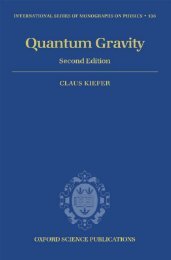The Physical Basis of The Direction of Time (The Frontiers ...
The Physical Basis of The Direction of Time (The Frontiers ...
The Physical Basis of The Direction of Time (The Frontiers ...
Create successful ePaper yourself
Turn your PDF publications into a flip-book with our unique Google optimized e-Paper software.
1<br />
<strong>The</strong> <strong>Physical</strong> Concept <strong>of</strong> <strong>Time</strong><br />
<strong>The</strong> concept <strong>of</strong> time has been discussed since the earliest records <strong>of</strong> philosophy,<br />
when science had not yet become a separate subject. It is rooted in the<br />
subjective experience <strong>of</strong> the ‘passing’ present or moment <strong>of</strong> awareness, which<br />
appears to ‘flow’ through time and thereby to dynamically separate the past<br />
from the future. This has led to the formal representation <strong>of</strong> time by the<br />
real numbers, and to the picture <strong>of</strong> a present as a point that ‘moves’ in the<br />
direction defined by their sign.<br />
<strong>The</strong> mechanistic concept <strong>of</strong> time is also based on this representation <strong>of</strong> time<br />
by the real numbers, but it avoids any subjective foundation: it is defined in<br />
terms <strong>of</strong> objective motion (in particular that <strong>of</strong> the celestial bodies). This<br />
concept is <strong>of</strong>ten attributed to Aristotle, although he seems to have regarded<br />
such a definition as insufficient. 1 A concept <strong>of</strong> time defined (not merely measured)<br />
by motion may indeed appear as a circular construction, since motion<br />
1 “<strong>Time</strong> is neither identical with movement nor capable <strong>of</strong> being separated from it”<br />
(Physics, Book IV). This may sound like an argument for some absoluteness <strong>of</strong><br />
time. However, the traditional philosophical debate about time is usually linked<br />
to (and <strong>of</strong>ten confused with) the psychological and epistemological problem <strong>of</strong> the<br />
awareness <strong>of</strong> time ‘in the soul’, and hence related to the problem <strong>of</strong> consciousness.<br />
This is understandable, since ancient philosophers could not have anticipated the<br />
role <strong>of</strong> physico-chemical processes (that is, motions) in the brain as ‘controlling<br />
the mind’, and they were not in possession <strong>of</strong> reasonable clocks to give time<br />
a precise operational meaning for fast phenomena. According to Flasch (1993),<br />
Albertus Magnus (ca. 1200–1280) was the first philosopher who supported a rigorously<br />
‘physical’ concept <strong>of</strong> time, since he insisted that time exists in Nature,<br />
while the soul merely perceives it: “Ergo esse temporis non dependet ab anima,<br />
sed temporis perceptio.”<br />
Another confusing issue <strong>of</strong> time in early philosophy, reflected by some <strong>of</strong> Zeno’s<br />
paradoxes, was the mathematical problem <strong>of</strong> the real numbers, required to characterize<br />
the continuum. Before the discovery <strong>of</strong> calculus, mathematical concepts<br />
(‘instruments <strong>of</strong> the mind’) were <strong>of</strong>ten thought to be restricted to the natural<br />
numbers, while reality would correspond to the conceptually inaccessible continuum.<br />
<strong>The</strong>refore, periodic motion was essential for counting time in order to grasp


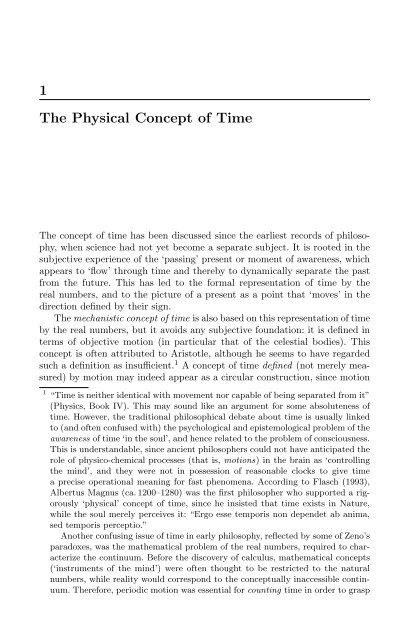
![arXiv:1001.0993v1 [hep-ph] 6 Jan 2010](https://img.yumpu.com/51282177/1/190x245/arxiv10010993v1-hep-ph-6-jan-2010.jpg?quality=85)
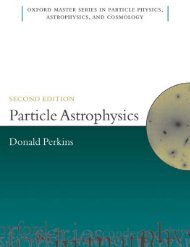
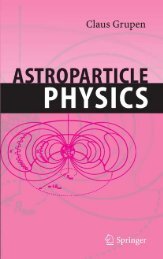
![arXiv:1008.3907v2 [astro-ph.CO] 1 Nov 2011](https://img.yumpu.com/48909562/1/190x245/arxiv10083907v2-astro-phco-1-nov-2011.jpg?quality=85)
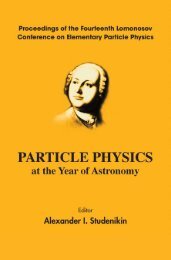
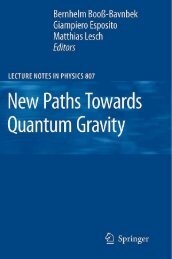
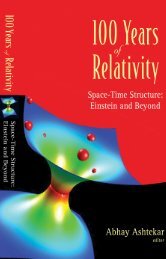
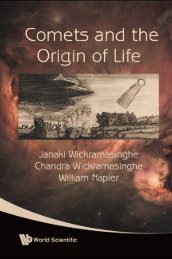
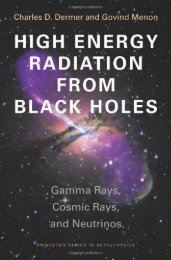
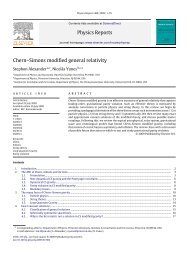
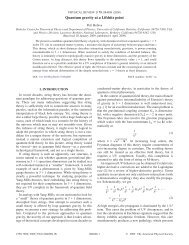
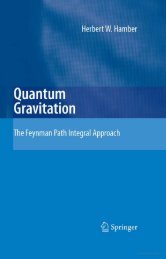
![arXiv:1002.4928v1 [gr-qc] 26 Feb 2010](https://img.yumpu.com/41209516/1/190x245/arxiv10024928v1-gr-qc-26-feb-2010.jpg?quality=85)
![arXiv:1206.2653v1 [astro-ph.CO] 12 Jun 2012](https://img.yumpu.com/39510078/1/190x245/arxiv12062653v1-astro-phco-12-jun-2012.jpg?quality=85)
